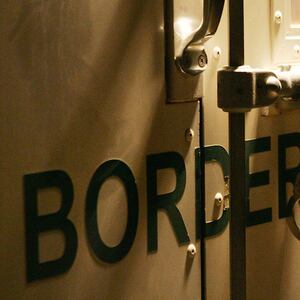DALLAS—The U.S. facility on the Mexico border where a migrant girl was held last week before she died is one of several Border Patrol bases the government previously found had contaminated drinking water. Some agents at the bases told investigators they refused to drink, wash their clothes or bathe in the water.
Jakelin Caal of Guatemala arrived with her father and 161 other migrants last week at Antelope Wells, New Mexico. The seven-year-old girl and others were held next to Bounds Forward Operating Base where she fell ill. Citing her father, officials said Caal “had not been able to consume food or water for days,” but a spokesperson for the father called that account inaccurate at a Saturday press conference.
“He is saying that, ‘My daughter is fine, she was eating, she was receiving liquids,’” said Ruben Garcia, the director of El Paso’s Annunciation House, where Caal’s father, Nery is staying. Garcia said Caal’s father told him that “she was fine as she was travelling through Mexico.”
The Department of Homeland Security did not respond to questions from The Daily Beast regarding conditions at Bounds or what kind of water Caal was offered.
While it’s unclear so far the exact role Bounds may have played in Caal’s death, the facility is among those that occasionally holds migrants and had persistent water problems, according to a 2016 DHS Office of the Inspector General report.
DHS investigators inspected all six operational forward operating bases (FOBs) on the southwest border in 2014 and 2015 and found that the bases were plagued with contaminated and potentially unsafe drinking water. They found “excessive amounts” of chlorine, iron and dirt in water at the bases, according to the report. Investigators also said the bases were not “consistently” inspected for health and safety concerns.
While the names of the bases are redacted, the report said all six FOBs experienced “an ongoing challenge to provide safe drinking water.” FOBs in the El Paso Sector, which includes Bounds, had “serious” health and safety concerns for personnel there.
“In addition to potential health and safety issues, the discolored and odorous water might affect the morale of personnel assigned to FOBs,” the report said of one base.
CBP occasionally added new filtration systems and told agents stationed at the bases that the water was safe to drink, according to the report. However, “some agents said they do not drink the water, cook with it, do laundry, or even bathe in it because of its taste and discoloration,” according to the report.
In 2012, the National Border Patrol Council, which represents law enforcement employees in the border region, criticized FOBs as unacceptable for their members saying they don’t meet standards for “temporary migrant camps.”
“There’s issues and problems with those things all the time,” a spokesperson for the council told The Daily Beast.
FOBs like Bounds aren’t equipped to handle medical emergencies like Caal’s. The bases are primarily used by agents patrolling the border and only sometimes used to temporarily hold migrants. Bounds is described in a 2011 labor complaint as being “comprised of camper trailers surrounded by metal shipping containers.” FOBs are required only to be staffed by “a person trained to administer first aid,” according to the National Border Patrol Council. Emergency medical services are often far from FOBs.
Eight hours after first arriving at Bounds, Caal and her father boarded a bus for the larger Lordsburg Border Patrol Station, a 90-minute drive away. Just before boarding, Caal’s father, told agents his daughter had been vomiting. Agents called ahead to have Border Patrol emergency medical technicians waiting at the station in Lordbsburg. Caal began having seizures and trouble breathing on the bus, according to DHS. Caal was taken by helicopter to a hospital in El Paso, where she died the next day.
“Their lives are beyond impossible,” Garcia said of migrants like Caal, her father, and others who travel to the United States. “Our policies are forcing people to do things that are really dangerous. We are structuring arms aimed at vulnerable human beings.”







